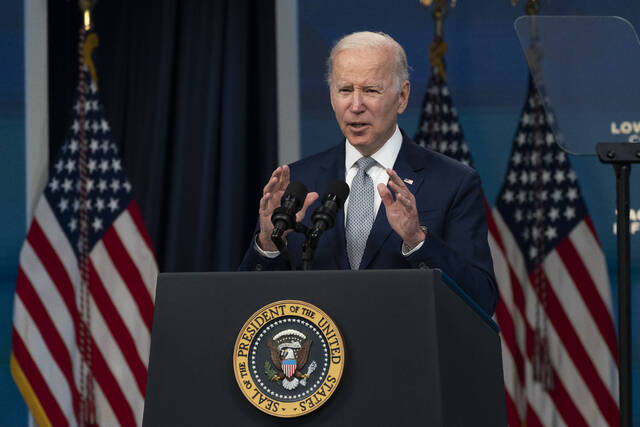Peter Morici: Biden needs some Republicans for his foreign policy team
Since World War II, U.S. foreign policy has promoted human rights and democracy by maintaining a superior military, offering security commitments to friends in Europe and Asia, and promoting free trade and investment among Western and nonaligned nations.
Through the World Trade Organization and regional agreements, the latter policy encouraged economic interdependence and prosperity that would make war among ancient rivals — like Germany and France — irrational.
After the first Cold War, expanding the club to include former communist rivals has proven a disaster. Russia had used the wealth gained from exporting gas and oil, agricultural commodities and metals to rebuild its military and stack up cyber weapons, hypersonic missiles and theater nuclear weapons.
European dependence on Russian gas and fear of direct military confrontation with Moscow have limited the weapons made available to Ukraine. Emboldened, Russia will likely snatch Ossetia from Georgia, destabilize Moldova and perhaps set sights on the Baltics states.
China’s market-socialist economy has exploited the market access gained through the WTO to steal industry. And build a military capable of capturing Taiwan and then blackmailing the West by withholding access to the island’s semiconductor fabrication plants.
Unmanaged free trade makes no sense if it empowers autocrats to rain hell on smaller neighbors and China to potentially hold Western democracies by the throat.
Free trade without guardrails empowers autocrats like Saudi Crown Prince Mohammed bin Salam, who refuses to pump more oil to lessen the burdens on democracies for imposing sanctions on Russia.
It enables India to partially frustrate Western sanctions by selling Russia consumer goods and industrial materials and buying its oil. And permits India and other nonaligned nations to turn a blind eye to Russia’s savage imperialism.
Economists lecture that free trade creates value by promoting specialization, but its greater contribution is by broadening markets to increase R&D budgets for innovators.
My work indicates that likely contributes about 1 percentage point to U.S. GDP growth annually. However, capturing absolutely all of those potential gains requires empowering regimes that murder their opponents and dominate their neighbors — and nonaligned nations who enable them.
The world is dividing into three spheres. Western democracies—those account for about 60% of global GDP. Autocratic states that engage in domestic repression and international terrorism, scoff at or subvert a rules-based international order, and pose an existential threat to democracy — China, Russia, Saudi Arabia, Iran and others that claim about one-third of GDP. And partially free and nonaligned states like Mexico and India.
We should be working in earnest to build and restore free trade relationships with Western democracies and, as much as possible, steer trade and investment to diversify supply chains away from autocratic states.
We want to enable the technological progress in Europe, Japan and Australia, and not unnecessarily add to the war and terrorism coffers in China, Russia, Iran and others.
And deal with the likes of India on a strictly transactional basis. Buying guns and oil from Russia is akin to purchasing fenced goods amid an epidemic of looting.
Domestically, we need to develop rather than curtail domestic oil and gas production, because the immediate opportunities to boost electrification of automobiles and homes are supply constrained by shortages, for example of lithium and other metals. And turning to the likes of Saudi Arabia and Venezuela for oil hardly promotes human rights and democracy.
All of this is terribly difficult for Washington to digest. President Donald Trump thought he could cozy up with Vladimir Putin and bully Xi Jinping, and President Joe Biden suffers three terrible disabilities.
Secretary of State Antony Blinken and the State Department act as if diplomacy can solve all problems, and the Defense Department has grown woke and unfocused.
Biden appears captive to the labor movement, hard-left progressives in Congress, West Wing policy advisers and regulatory appointees who are hostile to free trade and developing domestic energy resources.
To their credit the administration is pushing an industrial policy that promotes greater independence in semiconductors, battery materials, rare-earth minerals and basic pharmaceutical ingredients but a far broader policy is necessary to insulate the United States from China disabling U.S. industry in the event of conflict over Taiwan or elsewhere.
Biden needs a more balanced administration. Like Presidents Franklin D. Roosevelt, John F. Kennedy and Barack Obama he would do well to have some more conservative and Republican voices in his cabinet to balance the advice he receives.
Kennedy’s Treasury secretary, C. Douglas Dillon, served as President Dwight Eisenhower’s undersecretary of state, and Obama’s secretaries of defense included Robert Gates and Chuck Hagel.
The White House is too much a hothouse of economic isolationism and left-wing statism to champion a strong defense and free markets in a dangerous world.
Peter Morici is an economist and emeritus business professor at the University of Maryland.
Remove the ads from your TribLIVE reading experience but still support the journalists who create the content with TribLIVE Ad-Free.

